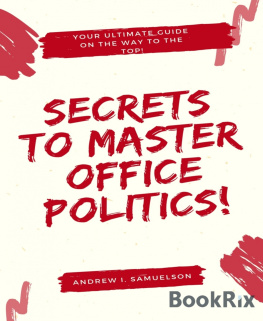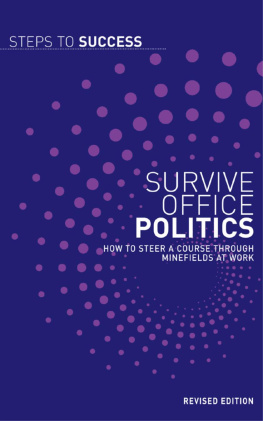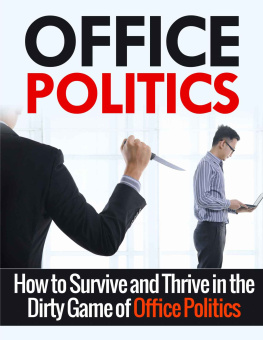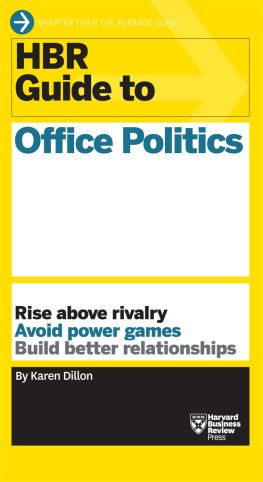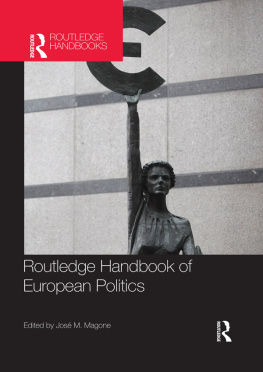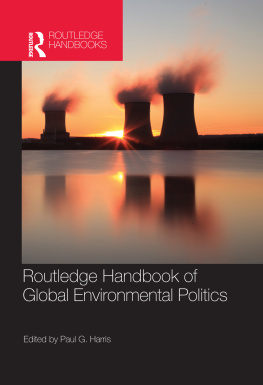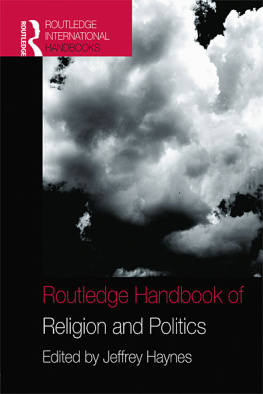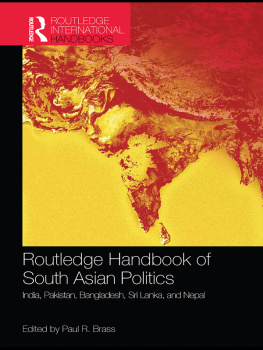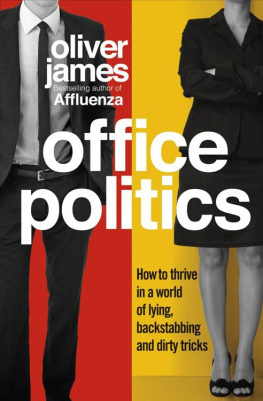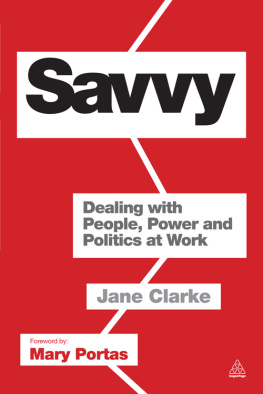Praise for The Office Politics Handbook
Having more than 35 years of higher education experience with 20-plus of those years in administrative roles, this is the first book I have found that addresses as clearly and succinctly the how to and why of office politics. The author shares his understanding of politics in a helpful, user-friendly manner; one that is mindful of the reader and engages her in a no-nonsense, meaningful way. If you sincerely want to enhance your comfort when involved with others, especially in your work setting, The Office Politics Handbook is a must-read.
Bernice Bass de Martinez, PhD, California State University, Sacramento
While many will read this book with the goal of career advancement, the principles in The Office Politics Handbook apply to countless other social situations. I read this book for professional development, [but] I quickly realized that Godwins advice was extremely helpful in all relationships, from dealing with managers and coworkers to dealing with my spouse and family members.
Amanda Benson, criminal defense attorney
THE OFFICE POLITICS HANDBOOK
WINNING THE GAME OF POWER AND POLITICS AT WORK
JACK GODWIN, PhD

Copyright 2013 by Jack Godwin, PhD
All rights reserved under the Pan-American and International Copyright Conventions. This book may not be reproduced, in whole or in part, in any form or by any means electronic or mechanical, including photocopying, recording, or by any information storage and retrieval system now known or hereafter invented, without written permission from the publisher, The Career Press.
THE OFFICE POLITICS HANDBOOK
EDITED AND TYPESET BY KARA KUMPEL
Cover design by Howard Grossman/12E Design
Printed in the U.S.A.
To order this title, please call toll-free 1-800-CAREER-1 (NJ and Canada: 201-848-0310) to order using VISA or MasterCard, or for further information on books from Career Press.

The Career Press, Inc.
220 West Parkway, Unit 12
Pompton Plains, NJ 07444
www.careerpress.com
Library of Congress Cataloging-in-Publication Data
The Library of Congress has cataloged the print edition as follows:
Godwin, Jack.
The office politics handbook : winning the game of power and politics at work / by Jack Godwin, PhD.
pages cm
Summary: The Office Politics Handbook is for business executives, managers, consultants, lawyers, agents, editors, and anyone who wants to become more politically astute, more powerful, and more successful. This is not a book on political game playing; it is for people who hate power games but who know that politics takes place in every organization and want to make sure they wind up on top of the heap...not at the bottom of the barrel -- Provided by publisher.
Includes bibliographical references and index.
ISBN 978-1-60163-279-1 (pbk.) -- ISBN 978-1-60163-513-6 (ebook) 1. Office politics. 2. Office politics--Handbooks, manuals, etc. I. Title.
HF5386.5.G63 2014
650.13--dc23
2013034206
For Emilia and Audrey.
Acknowledgments
Thanks to Tracey Culbertson, Lori Harrison, Michelle Loew, Eric Merchant, Mlima Morrison, Caroline Peretti, Josef Preciado, and Janis Silvers, as well as Ben Amata, Ed Baranowski, Bernice Bass de Martinez, Jerry Blake, Judy Boliver, Ric Brown, Karyl Burwell, Kevin Cornwell, Tom Carroll, Emiliano Diaz, Louis Downs, Smile Dube, Virginia Dixon, David Earwicker, Beth Erickson, Buzz Fozouni, Don Gerth, Alex Gonzalez, Alan Haslam, Julian Heather, John Kepley, Tom Krabacher, Kazue Masuyama, Ed Mills, Kathy Mine, Joan Neide, Chevelle Newsome, Melissa Norrbom, Hakan Ozcelik, Jon Price, Joanne Reilly, Karlos Santos-Coy, Richard Shek, Joe Sheley, Suzanne Swartz, Don Taylor, Catherine Turrill, Ernest Uwazie, Leo Van Cleve, Lori Varlotta, and all my friends and colleagues in the CSU.
Thanks to Dave Bewley-Taylor, Helen Fulton, Branwen Lloyd, Angela Jones, Jon Roper, Ieuan Williams, and everyone at Swansea University.
Thanks to Steffan and Margarita Todorov and everyone in the village of Iskar, Bulgaria.
Thanks to Laura McCaffrey and everyone at the US-UK Fulbright Commission.
Thanks to Anneke Archer, Andrew Hellman, Kira Mills, and everyone at CIES.
Thanks to Amanda Benson and Steve Plesser of Sacramento, California.
Thanks to Jeffery McGraw and Cricket Freeman of the August Agency.
Thanks to Robert S. Cooper, Esq., of Los Angeles, California.
Thanks to Christopher Ruddy and David Alliot of Newsmax.
Thanks to Edwin Duerr of San Francisco State University.
Thanks to Richard Chadwick and Shirley Daniel of the University of Hawaii.
Special thanks to Daniel, my brother.
Contents
Preface
To Begin With
Interpersonal relationships and politics have fascinated me since I was a child. I grew up in Southern California in the 1960s and 70s, in a fairly traditional American family with a father and mother and three brothers, two older and one younger. I was the middle child: self-sufficient, creative, and slightly introverted. Somewhere along the way, I developed an interest in stamp collecting. Even in those lazy pre-Internet days, stamp dealers had a way of finding stamp collectors, and they sent me parcels full of stamps from all over the world. This necessitated and accelerated my education in geography, history, literature, and, of course, politics.
My hobby, my place in the birth order, and my personality prepared me, somehow, for an apprenticeship in political science. As the middle child, I received less attention, but I had the right temperament and a discreet vantage point from which to observe the political dynamics of daily family life. The first lesson: Never discuss politics or religion in mixed company. Politics and religion are notoriously disruptive and so charged with emotion that disagreement and hard feelings are inevitable. This equationpolitics equals emotional tensionis why talking about politics is strictly forbidden at the dinner table.
What makes politics such a touchy subject? It has to do with power, which is not only a fact of life for everyone, but also a fascinating subject for social scientists. Psychologists may have mixed feelings about the subject but readily acknowledge power is an important dimension in interpersonal relationships. In political science, there is no ambivalence about power, only fascination. This is what separates the political science from all the other social sciences.
Awhile back, I was talking with one of the students who worked in my office. We were talking about writing. He suggested I read Stephen Kings On Writing, but I waved him off and told him I was not a fan of Kings books. Its not that kind of book, he said, its a memoir about writing. It came out in 2000, after the car accident. You should read it. So I did.
I remember one passage in particular: Writers are also readers, King said, and fans of other writers. Often when you read something so good, you say to yourself, I could never write that well. That is, until the moment when you read something so bad you say to yourself, I can do better than that. I can remember the book I was reading when I had Kings Epiphany. I can even remember the offending clause: By the beginning of the last decade of the twentieth century wrote the very famous writer, who shall remain anonymous. I did the math and decided By 1990 would have been more economical. Kings advice planted the seed that grew into my first book, then another, and now this one.
Next page

